Dental Implants
Dental implants are widely recognized as the most effective permanent solution for missing teeth. They provide a long-lasting and stable solution for tooth replacement, and can help improve chewing ability, aesthetics, speech, and overall oral health. At Vitality, we have departed from the conventional dental implant methods, and instead we offer the modern and precise Computer-Guided Dental Implant method for all your dental implant solutions such as Single and Multiple Dental Implants, Full mouth Reconstruction & Full Arch Dental Implant solutions (All-on-6’s All-on- 4’s), Immediate and Same-Day Dental Implant placement.

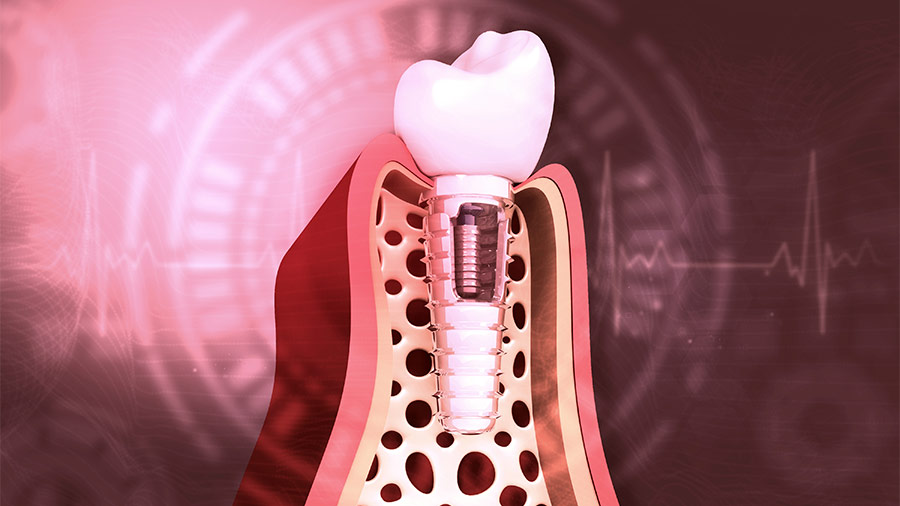
Why Patients Choose Us for Dental Implants
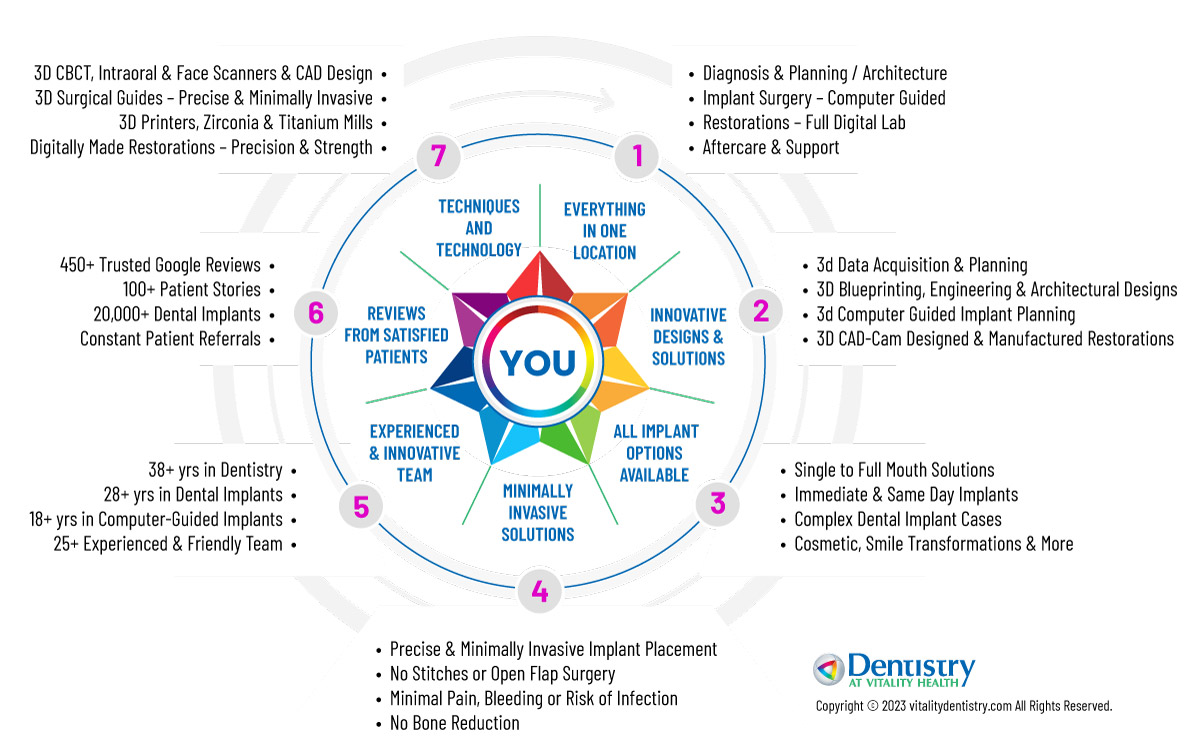
Computer Guided Dental Implants
Computer-guided dental implant placement is a precise surgical technique that uses computer technology and 3D imaging to plan solutions and place dental implants with a surgical guide, leading to high accuracy, improving outcomes and reducing risks. At Vitality, our 3D imaging includes 3D CBCT scans, 3D intra oral scans and 3D facial scans, to achieve the best desirable results possible.
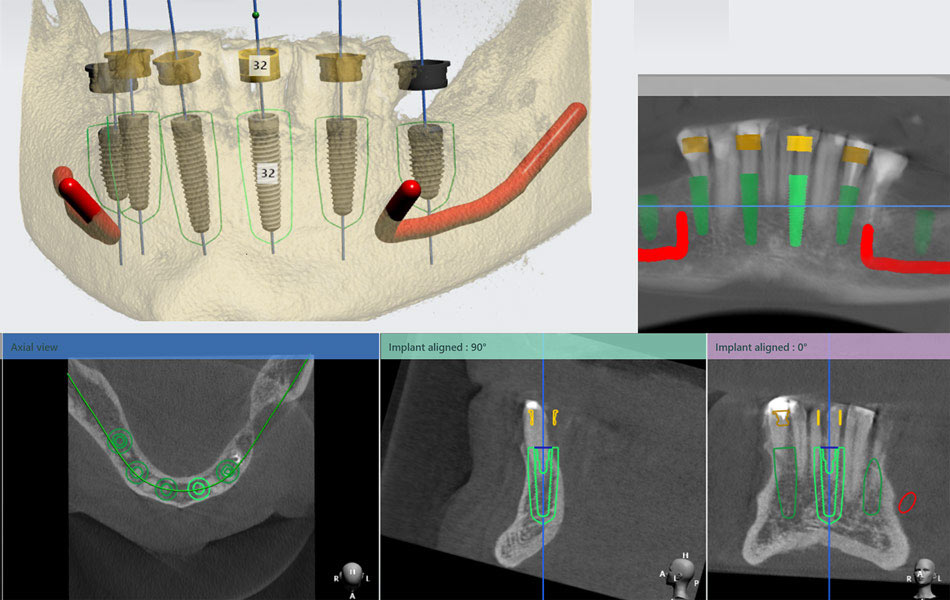
Computer-guided dental implant solutions use modern technology and accurate planning to provide higher precision, reduced risks, and quick desirable outcomes, while conventional methods rely on manual measurements, stitches, bone reduction and eyeballing which may lead to less accurate, longer and risky outcomes. Conventional dental implant solutions also require more repairs, and are also more costly in the long run since those solutions and restorations are not as durable as computer guided dental implant solutions and restorations, especially for full arches .
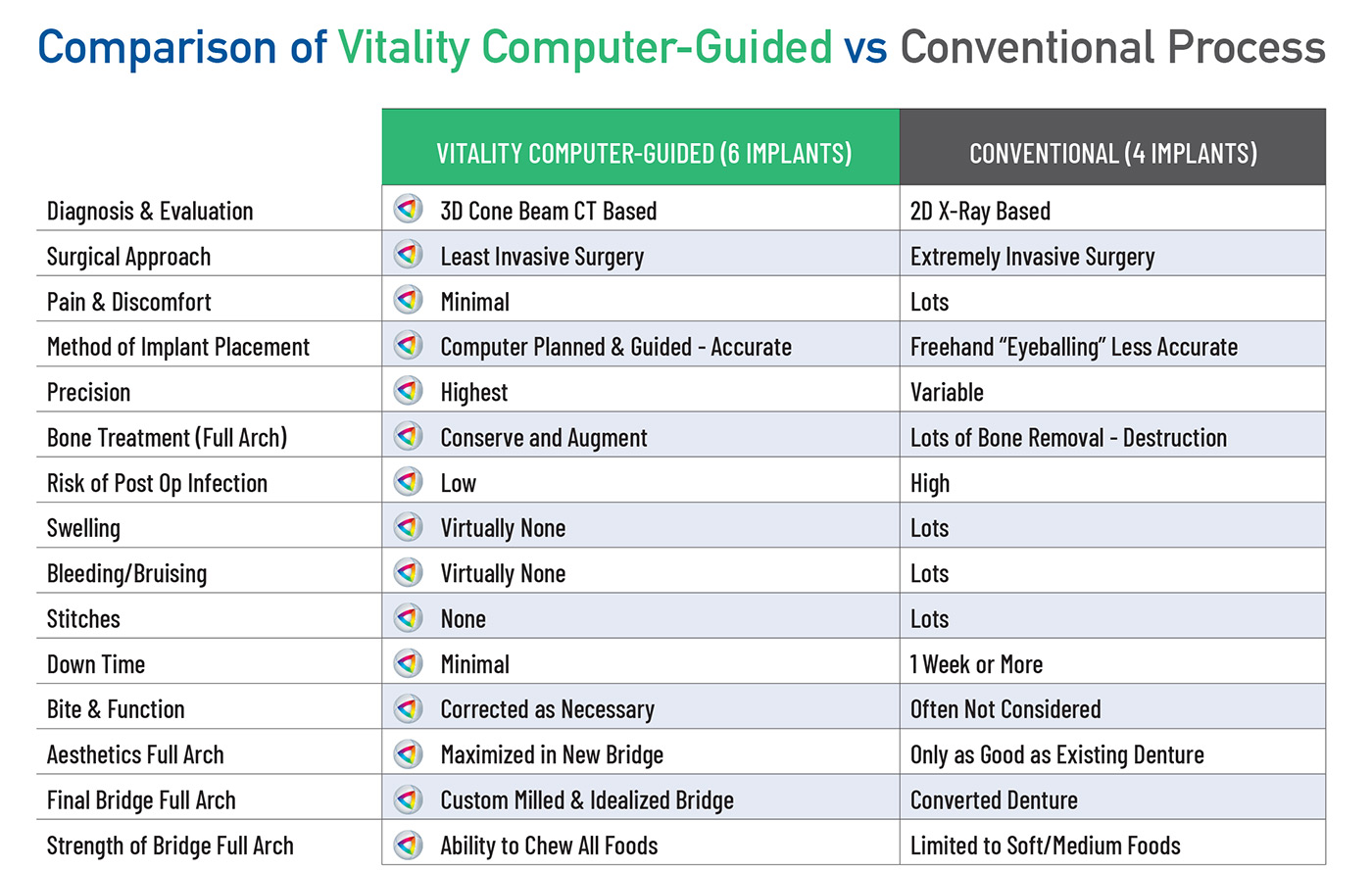
Computer-guided dental implant methods offer quick and precise placement, reducing risks, minimizing discomfort and producing optimal results, while also often leading to faster and minimally invasive procedures with shorter recovery times, no need for bone removal and virtually no bleeding or stitches.
Our Comprehensive Computer Guided Dental Implant Solution Include
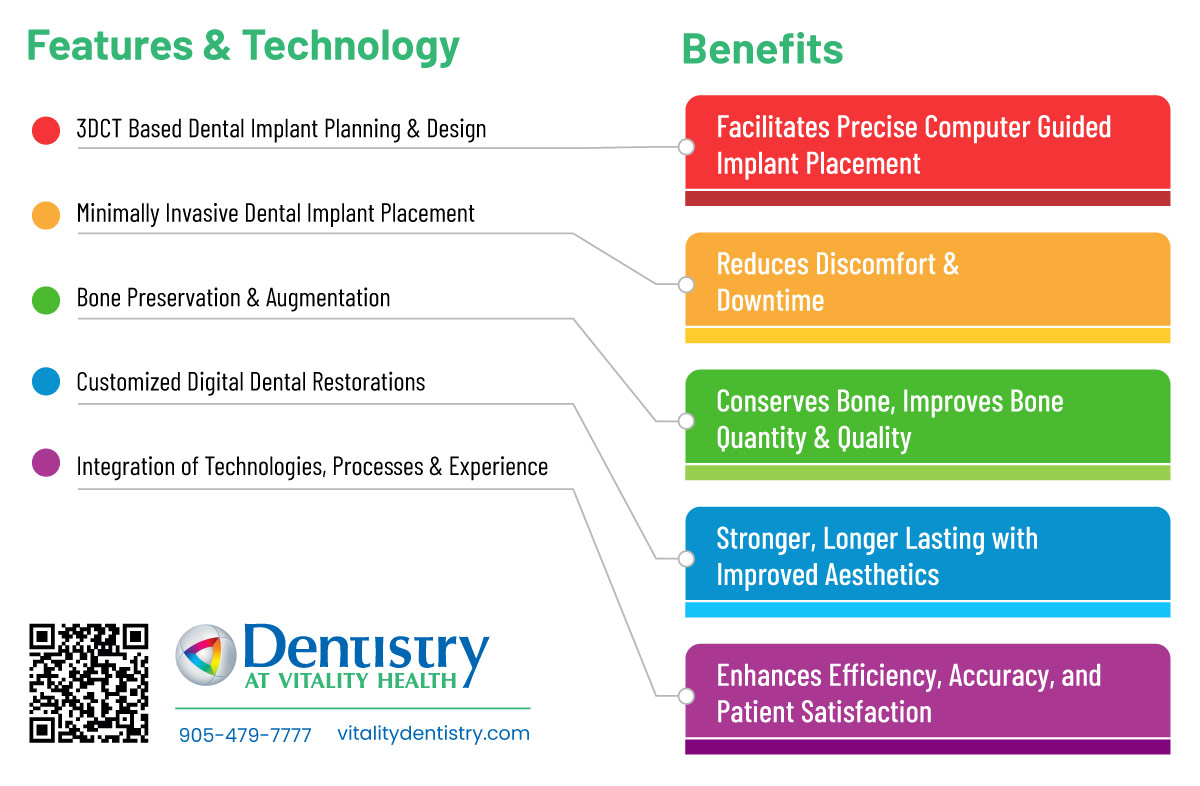
Immediate Dental Implants refer to a procedure where a dental implant is placed in the jawbone immediately after a tooth extraction, without a waiting period. This approach allows for quicker tooth replacement, often with a temporary crown or bridge attached on the same day. Successful immediate dental implants depend on factors such as the patient’s oral health, bone quality, and proper planning with Computer Guided techniques.
Same day Dental Implants at Vitality refer to the placement of computer guided dental implants, and in some cases a temporary restoration on the same day, but in a position in the jaw that has already healed from the missing tooth/teeth .
Both Immediate and Same day dental implants are planned using Computer Guided Technology at Vitality for a Single Tooth, Multiple Teeth, and Full Arch / Full Mouth solutions (All-on-4 or All-on-6 Implants)
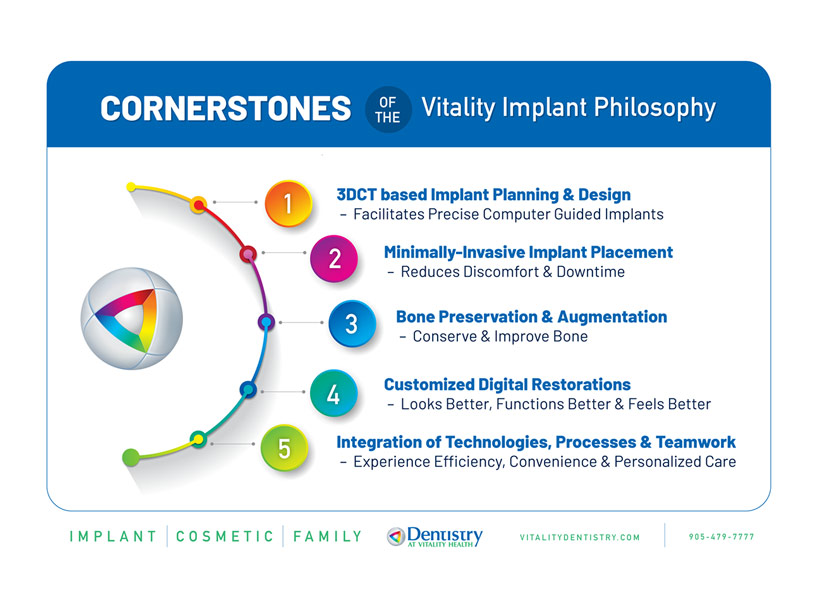
At Vitality, we don’t just offer part of the solution, we provide the full solution from start to finish and as quick as 1 day! We are able to achieve this complete service thanks to a combination of our in-house 3D CBCT & Digital Intra Oral Prime Scanners, our full spectrum in house Digital Dental Laboratory, dedicated dental implant team and our 38+ years of dental experience! We provide you with a free dental implant consultation and a VIP facility tour so you can see and experience firsthand how we can help you. This is not your typical consultation; this is a thorough overview of all your dental implant solutions, including the Vitality Implant Premium services offered by us using our full digital workflow and technology.
You can book your free, no obligation consultation by clicking below
Dental Implant Solutions
Computer Guided Dental Implants can be used to replace:
Full Arch Dental Implants – “All-on-6”s, “All-on-4”s and much more…
Full arch and full mouth dental implant solutions are complex and often involve many crucial steps and planning to produce the desirable results. Luckily for you, at Vitality we have optimized our workflow in one location, using modern digital technology in both our clinic and in house dental laboratory which translates to your solutions and final restorations being made faster, stronger, more precise, least invasive, and can be done with virtually no pain, bleeding, or stitches!
The philosophy for designing full-arch dental implant solutions places a strong emphasis on achieving the best possible restoration, one that maximizes aesthetics and function, while also ensuring lip support and other essential considerations. This approach prioritizes the end result and follows a specific sequence:
- Starting with the Ideal Restoration: The process commences with the envisioning and design of the optimal restoration. This involves a detailed and comprehensive understanding of the patient’s unique needs, including aesthetic desires, functional requirements, and other considerations.
- Comprehensive Approach: Instead of focusing solely on implant placement, this philosophy takes a comprehensive approach. It recognizes that the restoration’s success depends not just on the dental implants themselves but on how they support the final design. The goal is to harmonize the patient’s appearance, comfort, and oral health in the best possible way.
- Integration with CT Scans: Our design process integrates with CT scans, intraoral scans, 3D facial scans and other diagnostic tools to ensure that implant positioning aligns precisely with the ideal restoration. This means planning the implants in a manner that optimally supports the future restoration’s form and function.
- Preventing Suboptimal Outcomes: By prioritizing the restoration’s design in the planning phase, this approach aims to prevent suboptimal outcomes that can occur when implants are placed first and the restoration is designed later. In such cases, the final result may be less aesthetically pleasing and functional due to a lack of alignment between implant placement and restoration design.
- Customization: Each case is treated as unique, and the design takes into account the patient’s individual anatomy and requirements. This allows for highly customized solutions that maximize patient satisfaction.
In summary, the philosophy for designing full-arch dental implant solutions places the ideal restoration at the forefront of the process. By prioritizing the end result and aligning implant placement with the desired restoration, it seeks to provide patients with the most aesthetically pleasing, functional, and comfortable outcomes, while avoiding the pitfalls of a more common practice that may result in less-than-ideal restorations.
Book your free consultation to experience how our philosophy can help you today
Full arch dental implant solutions are designed as a long- term solution for the complete replacement of failing or missing teeth in the upper and/or lower jaws. The “All-on-4” dental implant solution, utilizing 4 dental implants and a converted denture, or a hybrid acrylic bridge was originally designed as the cheapest solution to replace failing full dentures. However, it is prone to breakage if it is used heavily. Depending on your needs and expectations, your ideal solution might be very different from the typical “All-on-4” solution!
In our experience of 28+ years, a full arch bridge supported by 6 (or more) implants usually has a better long-term prognosis than a bridge that is supported by the minimum (4) implants. It also allows us to add more teeth to give you a larger chewing surface. If you tend to have a large jaw, heavier bite, tend to clench or grind your teeth, or would like to chew tougher or crunchier foods, then your ideal implant solution should take all these factors into account. You may also need a restoration that is manufactured with a titanium framework, with zirconia teeth for the best in strength and esthetics.
The number of dental implants needed will depend largely on the amount of available bone. For example, we may either be able to use fewer, but longer implants, or we may need to use a greater number of shorter dental implants to ideally support the anticipated forces on the final implant bridge. With additional dental implants, the “span” between implants is also shorter, decreasing the likelihood of fracture of the final bridge under heavy chewing forces. If this is starting to sound like engineering, its because it essentially is!
Architecting and engineering an optimal solution takes a lot of experience and meticulous planning, and the help of modern technology, to get it just right!
Why not come in for your free consultation and discuss how we can design your ideal New Smile!
It’s important to note that providers of other “All-on-4” solutions usually use a different method by converting your existing denture to a fixed denture/ “bridge”, which is a weaker solution and can lead to more repairs and more overall cost later on. Those implants are also done with conventional methods vs. computer guided methods, and even if done computer guided, the workflows are different.
For a strong, durable permanent solution with less maintenance and overall cost later on, it is recommended to opt for an “All-on-6” solution and a sturdier final bridge (Zirconia instead of the typical Acrylic). Computer-guided technology and optimized digital workflows allow this ideal situation to become a reality at Vitality.
Having a full-service dental facility with everything in one location is convenient and efficient. There is no need for you to visit multiple dental offices or have your work sent to another lab for your solution to be completed, since we have everything you need.
Your optimal dental implant solution will require:
- 3D CBCT evaluation of the available bone in your jaw,
- 3D intraoral scans of your mouth
- 3D facial scans
- meticulous planning of the dental implant as well as the final crown or bridge.
- design and manufacture of a surgical guide to allow precise, minimally invasive dental implant placement,
- design & fabrication of strong, temporary bridges
- design & fabrication of strong, precise, and beautiful final bridges
- surgical placement of the dental implants
- manufacture, customization and placement of temporary & final bridges and more …
Fortunately, with our in-house CBCT scanner, Intraoral & 3D facial scanners, design software, 3D printers, 3D CAD-CAM mills, fully digital dental laboratory, full time laboratory manager, and 60+ years of combined experience of our dental implant team, you can get everything completed in one convenient location!
Efficiency & quick turnaround also means that we can offer you tremendous value for the investment in your health and confidence!
Your free dental implant consultation will give you the knowledge you need to make informed decisions regarding the best solutions for restoring your smile, confidence, mood, enjoyment of food, and overall health!
BOOK your free consultation now!
Dental Implant Crowns or bridge?
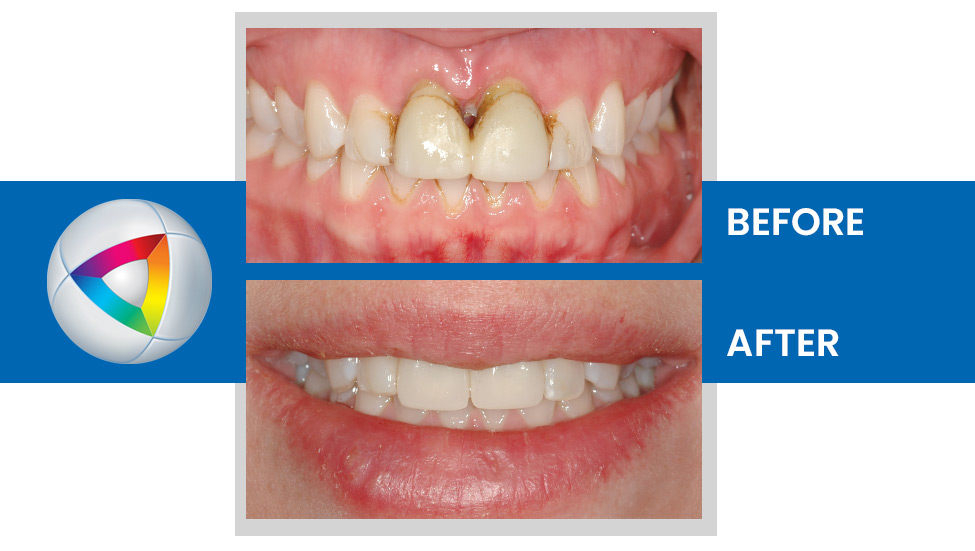
Problem: A patient presented with a failing upper bridge and was unhappy with the colour of her teeth. It was important to her to have individual teeth for her final solution.
Solution: We designed a customized solution with two computer guided dental implants and final restorations using two screw retained porcelain crowns.
Multiple implants with individual crowns involve placing multiple dental implants into the jawbone to replace missing teeth, and then attaching individual crowns to each implant. This approach restores both function and aesthetics, allowing each tooth to be independently supported and customized for a natural-looking and fully functional smile. It’s a common and effective solution for replacing multiple missing teeth without affecting adjacent healthy teeth.
An implant-supported bridge is a dental prosthesis used to replace missing teeth. It consists of multiple artificial teeth (pontics) connected together, and it is supported by dental implants rather than natural teeth or other dental support structures. Dental implants are surgically placed in the jawbone to serve as sturdy anchors for the bridge, providing stability and functionality similar to natural teeth. This type of bridge is often recommended when a patient is missing several adjacent teeth and wants a more stable and long-term solution compared to traditional removable bridges or dentures. We manufacture these in house!
Single Dental Implant & Crown
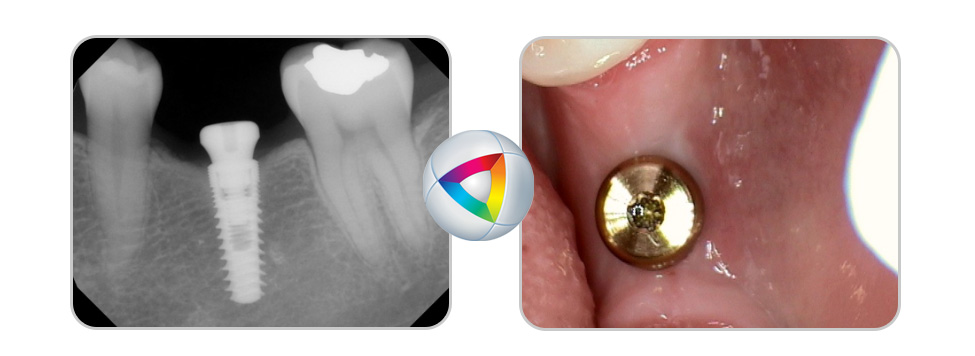
The above shows how a Computer Guided Dental Implant done by Dr Singh looks immediately after placement. Note how clean, precise and non-invasive without needing stitches.
- We conduct a thorough examination, which include 3D CBCT Scans, intraoral prime scans, and 3D facial scans to assess the condition of your jaw and surrounding structures.
- We determine your options for a dental implant based on factors like bone volume, anatomy and overall oral health.
- The dental implant is surgically placed into your jawbone using a custom made digitally manufactured surgical guide in house. This dental implant acts as an artificial tooth root. A healing abutment, also known as a healing cap can help promote soft and hard tissue healing around an implant. The healing cap also protects the main part of the implant from plaque and debris accumulation.
- Over a few months, the implant fuses with your jawbone through a process called osseointegration. This provides a stable foundation for the replacement tooth or crown.
After osseointegration is complete, a small connector piece called an abutment is attached to the implant. This abutment supports the crown. It is possible to place a crown on the same day of dental implant placement but is it not always advisable. This can be discussed more at your free consultation.
- A custom-made dental crown, designed to match the color and shape of your natural teeth, is fabricated using our CAD/CAM technology.
- The crown is then attached to the abutment, creating a functional and aesthetically pleasing replacement for the missing tooth.
- All our crowns are retrievable (screw retained) since new research has shown that the cement used in bonding a crown can be detrimental to the long term health of a dental implant.
The only way to know your specific treatment options is for a proper diagnosis to be done. Dental problems, just like medical problems need to be clinically assessed, with the addition of diagnostic imaging and scanning.
This information, combined with an understanding of your wants and expectations will allow us to provide you with all viable treatment options. Your personalized treatment coordinator will review these options with you to allow you to choose the solution that’s best for your needs.
Understanding of your wants and expectations is one of the most important things we do. Why not take the first step in understanding our process and seeing how it can benefit you? As a bonus, we will also provide you with a dental implant checklist that you can use to help you compare the differences between solutions that you may have proposed to you by various providers.
Book your free consultation today!
Get to know us better!
“I have undergone surgical and restorative phases of full bite reconstruction for over 8 months at Vitality Dentistry and had used temporary crowns on implant supported bridges during the course of my treatment before fixed crowns were inserted. I was amazed at how the technique and technology were utilized together and it worked really well. From the initial surgical and computer-guided implant placement which to me was painless, to the insertion of the bridges all done surprisingly in one day, I went home as if I didn’t lose a tooth from the procedure. The staff are pleasant and very professional. Thanks for bringing back my confidence to smile again.”
Jamie A
Dental Implant Patient at Vitality



